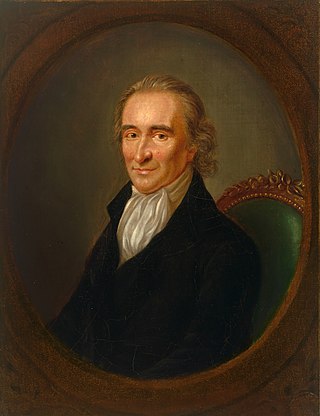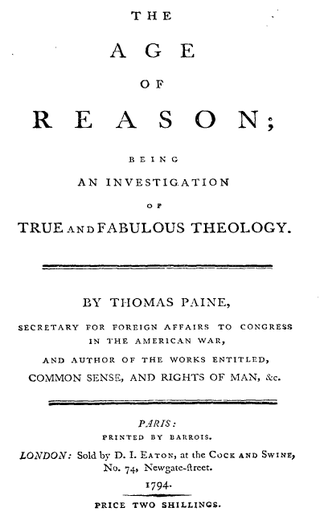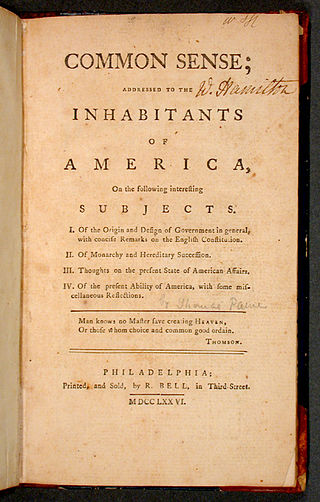
Thomas Paine was an English-born American Founding Father, French Revolutionary, political activist, philosopher, political theorist, and revolutionary. He authored Common Sense (1776) and The American Crisis (1776–1783), two of the most influential pamphlets at the start of the American Revolution, and he helped to inspire the Patriots in 1776 to declare independence from Great Britain. His ideas reflected Enlightenment-era ideals of human rights.

The Age of Reason; Being an Investigation of True and Fabulous Theology is a work by English and American political activist Thomas Paine, arguing for the philosophical position of deism. It follows in the tradition of 18th-century British deism, and challenges institutionalized religion and the legitimacy of the Bible. It was published in three parts in 1794, 1795, and 1807.
The Whigs were a political party in the Parliaments of England, Scotland, Ireland, Great Britain and the United Kingdom. Between the 1680s and the 1850s, the Whigs contested power with their rivals, the Tories. The Whigs merged into the Liberal Party with the Peelites and Radicals in the 1850s. Many Whigs left the Liberal Party in 1886 to form the Liberal Unionist Party, which merged into the Conservative Party in 1912.

William Pitt the Younger was a British statesman, the youngest and last prime minister of Great Britain from 1783 until the Acts of Union 1800 and then first prime minister of the United Kingdom from January 1801. He left office in March 1801, but served as prime minister again from 1804 until his death in 1806. He was also Chancellor of the Exchequer for all of his time as prime minister. He is known as "Pitt the Younger" to distinguish him from his father, William Pitt, 1st Earl of Chatham, who had previously served as prime minister and is referred to as "William Pitt the Elder".

William Godwin was an English journalist, political philosopher and novelist. He is considered one of the first exponents of utilitarianism and the first modern proponent of anarchism. Godwin is most famous for two books that he published within the space of a year: An Enquiry Concerning Political Justice, an attack on political institutions, and Things as They Are; or, The Adventures of Caleb Williams, an early mystery novel which attacks aristocratic privilege. Based on the success of both, Godwin featured prominently in the radical circles of London in the 1790s. He wrote prolifically in the genres of novels, history and demography throughout his life.

The London Corresponding Society (LCS) was a federation of local reading and debating clubs that in the decade following the French Revolution agitated for the democratic reform of the British Parliament. In contrast to other reform associations of the period, it drew largely upon working men and was itself organised on a formal democratic basis.

Sir James Mackintosh FRS FRSE was a Scottish jurist, Whig politician and Whig historian. His studies and sympathies embraced many interests. He was trained as a doctor and barrister, and worked also as a journalist, judge, administrator, professor, philosopher and politician.

Common Sense is a 47-page pamphlet written by Thomas Paine in 1775–1776 advocating independence from Great Britain to people in the Thirteen Colonies. Writing in clear and persuasive prose, Paine collected various moral and political arguments to encourage common people in the Colonies to fight for egalitarian government. It was published anonymously on January 10, 1776, at the beginning of the American Revolution and became an immediate sensation.

William Wyndham Grenville, 1st Baron Grenville, was a British Pittite Tory politician who served as Prime Minister of the United Kingdom from 1806 to 1807, but was a supporter of the Whigs for the duration of the Napoleonic Wars. As prime minister, his most significant achievement was the abolition of the slave trade in 1807. However, his government failed to either make peace with France or to accomplish Catholic emancipation and it was dismissed in the same year.

Rights of Man (1791), a book by Thomas Paine, including 31 articles, posits that popular political revolution is permissible when a government does not safeguard the natural rights of its people. Using these points as a base it defends the French Revolution against Edmund Burke's attack in Reflections on the Revolution in France (1790).
The Society of the Friends of the People was an organisation in Great Britain that was focused on advocating for parliamentary reform. It was founded by the Whig Party in 1792.

The American Enlightenment was a period of intellectual and philosophical fervor in the thirteen American colonies in the 18th to 19th century, which led to the American Revolution and the creation of the United States of America. The American Enlightenment was influenced by the 17th- and 18th-century Age of Enlightenment in Europe and native American philosophy. According to James MacGregor Burns, the spirit of the American Enlightenment was to give Enlightenment ideals a practical, useful form in the life of the nation and its people.

Letters from a Farmer in Pennsylvania is a series of essays written by the Pennsylvania lawyer and legislator John Dickinson (1732–1808) and published under the pseudonym "A Farmer" from 1767 to 1768. The twelve letters were widely read and reprinted throughout the Thirteen Colonies, and were important in uniting the colonists against the Townshend Acts in the run-up to the American Revolution. According to many historians, the impact of the Letters on the colonies was unmatched until the publication of Thomas Paine's Common Sense in 1776. The success of the letters earned Dickinson considerable fame.

The 1794 Treason Trials, arranged by the administration of William Pitt, were intended to cripple the British radical movement of the 1790s. Over thirty radicals were arrested; three were tried for high treason: Thomas Hardy, John Horne Tooke and John Thelwall. In a repudiation of the government's policies, they were acquitted by three separate juries in November 1794 to public rejoicing. The treason trials were an extension of the sedition trials of 1792 and 1793 against parliamentary reformers in both England and Scotland.

The Revolution Controversy was a British debate over the French Revolution from 1789 to 1795. A pamphlet war began in earnest after the publication of Edmund Burke's Reflections on the Revolution in France (1790), which defended the House of Bourbon, the French aristocracy, and the Catholic Church in France. Because he had supported the American Patriots in their rebellion against Great Britain, Burke's views sent a shockwave through the British Isles. Many writers responded to defend the French Revolution, such as Thomas Paine, Mary Wollstonecraft and William Godwin. Alfred Cobban calls the debate that erupted "perhaps the last real discussion of the fundamentals of politics" in Britain. The themes articulated by those responding to Burke would become a central feature of the radical working-class movement in Britain in the 19th century and of Romanticism. Most Britons celebrated the storming of the Bastille in 1789 and believed that Kingdom of France should be curtailed by a more democratic form of government. However, by December 1795, after the Reign of Terror and the War of the First Coalition, few still supported the French cause.

John Reeves was a legal historian, civil servant, British magistrate, conservative activist, and the first Chief Justice of Newfoundland. In 1792 he founded the Association for Preserving Liberty and Property against Republicans and Levellers, for the purpose suppressing the "seditious publications" authored by British supporters of the French Revolution—most famously, Thomas Paine's Rights of Man. Because of his counter-revolutionary actions he was regarded by many of his contemporaries as "the saviour of the British state"; in the years after his death, he was warmly remembered as the saviour of ultra-Toryism.

Sir Archibald Macdonald, 1st Baronet was a Scottish-born English lawyer, judge and politician.
Mark Philp is a British political philosopher and historian of political thought who specialises in British political thought in the late 18th and early 19th centuries. He has published books on Thomas Paine and on responses to the French Revolution in Britain.
John Gifford was an English political writer. He was born John Richards Green until changing his name at the age of 23.

The trial of Thomas Paine for seditious libel was held on 18 December 1792 in response to his publication of the second part of the Rights of Man. The government of William Pitt, worried by the possibility that the French Revolution might spread to England, had begun suppressing works that espoused radical philosophies.